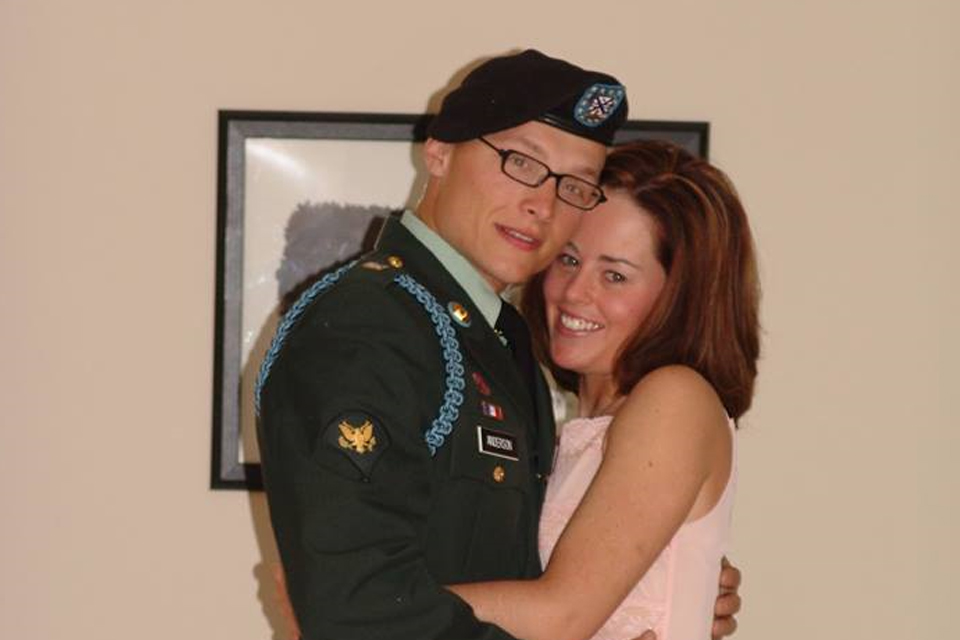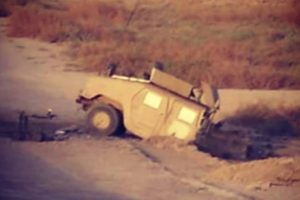Everyone strives for success, but Sami (Fitzjarrald)’00 and Garrett Anderson ’10 found theirs in an unlikely way, making this a unique and triumphant story to share.
The two graduated from Illinois State University with degrees in criminal justice sciences. Garrett’s life-long goal was to be a police officer, but first he enlisted in the U.S. Army.
“It was a family thing,” said Garrett. “My dad was in the Navy. My brother was a Marine. It was a way for me to give back. To serve in the military was an honor. I was fortunate to have earned my education through my service. In a way, it made me grow up faster and get more life experience than the average student.”
Sami, on the other hand, wanted to work in corrections on the administrative side. Illinois State was one of the only universities she knew offered criminal justice as a major. While attending Illinois State, Sami obtained an internship at a law firm, Lerner and Kirchner in Champaign, that focused on criminal defense.
“I originally wanted to work in corrections, but I ended up completing the internship and staying and working for four years after graduation,” she stated. “Working there as criminal defense with clients and handling their issues was the direction I wanted to go.”
Garrett was on a path paved by the U.S. Army, while Sami was on a road that led to law school. Both living in Champaign, the two met at a local bar in 2004 and hit it off. They were married on March 22, 2005, in Grand Rapids, Michigan, when Garrett was home on leave before he went to Iraq.
“What’s funny is that her mother and sister went to Illinois State,” said Garrett. “My stepdad retired as an electrician from Illinois State, too.”
During their first year of marriage, Sami was in her second year of law school at Thomas M. Cooley School of Law in Michigan, while Garrett was doing military service in Iraq.
In October 2005, Garrett was on patrol with four other soldiers and interpreters. A bomb detonated underneath the vehicle he was driving. What came of this was a traumatic brain injury, damage to his jaw, and the amputation of his right arm.
Sami received news that Garrett was severely wounded and would have to stay at Walter Reed Army Medical Center for a prolonged period.
“My initial thought was how our life plan was suddenly kind of taken,” she said. “The things we had talked about prior to injury became skewed. We were married for six months and never lived together and now we have a significant war injury.”
After Garrett’s injury, Sami stayed at Walter Reed Army Medical Center with him and went to Columbus School of Law full time. During this, she was also working remotely for the law office in Champaign.
Garrett was released from Walter Reed in May 2006 and had to quickly adjust to a new lifestyle in a different environment.
“I had set things that I was doing during my time in the service, but when I got out, it was a free-for-all,” he added. “The perceptions changed. I had to adjust. Another adjustment is that need or feeling of achievement. I had a higher purpose in the military, and I lost that purpose when I came back. I needed a new set of goals.”
This led Garrett to pursue his degree in criminal justice studies at Illinois State. After graduating, he worked for U.S. Congressman Rodney Davis as a constituent services representative to assist veterans with their writing difficulties and challenges.
Garrett’s work fulfilled him, and he found a higher purpose and continued setting new goals for himself.
When he obtained his master’s degree in rehabilitation counseling at the University of Illinois, it was very clear what he wanted to do and who he wanted to help.
“I work with transitioning veterans in mentoring programs, and I help them get their education to move on and be the next generation to get to that next step in their life,” he said. “I tried social work, but it didn’t resonate with me. This is really something that resonates with me because it’s harder and it’s good to help people out.”
He pairs war veterans with tutors or mentors and helps them get involved in volunteering. Garrett also highlights as a motivational speaker at schools and nonprofit organizations. He shares his story of overcoming hardships after war.
“I don’t think I work a day in my life because I love, love, love what I do. If I can change one man’s trajectory, maybe I can change someone else.”
Garrett’s resilience and his encouraging attitude earned him a place in the Illinois State University Academy of Achievement in 2017. This honor recognizes some of its successful younger alumni in the College of Applied Science and Technology.
“It was humbling because I don’t see myself in the final stages that I would classify,” said Garrett. “I think there’s more that I can do, but it does feel good to help people who are going through situations that I went through myself.”
After Garrett’s accident, Sami thought that their life together was turned upside down and she had a lot of questions, specifically “What are we going to do now?”
“We didn’t know how to move forward. There is no road map for that, or even counseling. I was 26 so nothing major like that had ever happened in my life.”
Sami was worried about Garrett’s injuries even after he was released from Walter Reed because in that time, brain injuries were not considered a significant injury. Garrett had constant headaches, and they were forced to find new providers.
Not only did they have to cope with Garrett’s physical injuries, but they had financial stress to consider and worried about how to secure benefits and deal with the legality of their situation.
Due to the stress that they faced together, Sami decided to open her own practice. She wanted to provide legal services to injured veterans and their families on a pro bono basis. As an issue near and dear to her heart, Sami treats her clients with the compassion that her and her husband did not receive during their hard transition.
“The most important part of my job is the trust of my clients,” she said. “They need to feel like even though I’m not reaching out to them every day, things are being handled. Being able to navigate very emotional days during this traumatic time for them is hard.”
In addition, she created a program called Wills for Soldiers, which provides legal assistance when preparing wills and powers of attorney for soldiers who are being deployed.
“When Garrett deployed, he needed powers of attorneys for finances, healthcare, and a will. We were just dating, and the military does a generic and quick process. What we can do for soldiers is make sure that they have a complete understanding of what these documents mean because these are usually 18- to 22-year-olds.”
Sami’s pro bono work with soldiers and the establishment of Wills for Soldiers garnered her a spot in the College of Applied Science and Technology’s Academy of Achievement in 2019, just two years after Garret received his recognition.
“When I was first notified, I didn’t think I had done anything in my career that was crazy outstanding,” she said. “I just did things that I thought should be done, things we should normally do because we’re human beings. I was a little bit shocked because I don’t do it for recognition. I just can’t stand when people find themselves in situations that are so difficult.”
Although life after Garrett’s accident was not what Sami and Garrett expected, they have not only adjusted, but they have thrived.
The two are living in Gifford, Illinois, with two daughters, ages nine and 12. They like to grow vegetables in their garden and ride motocross with their kids.
“Life is really good,” Sami exclaimed. “Garrett has surpassed any of my initial thoughts. I recently told him he’s gotten to his place and he’s finally there.”
“I’m proud of my wife and our journey so far,” Garrett added. “She does more work than I do.”
In a life full of twists and turns, surprises, and pain, Sami and Garrett have learned to embrace the challenges that they have been presented with. They both believe that this injury, as traumatic as it was, has shaped their life together in the best way possible. They would not change their situation in any way. When asked how to handle adversity and unexpected life changes, they say the following:
“You learn from your mistakes,” said Garrett. “It’s going to make you a stronger person. God simply gave me this story to level out the playing field for everyone else.”
“I know at the time you’re facing it, you can’t see past it,” said Sami. “But there is a past it. I have never been disappointed by seeing something through and letting the obstacle beat us up.”



